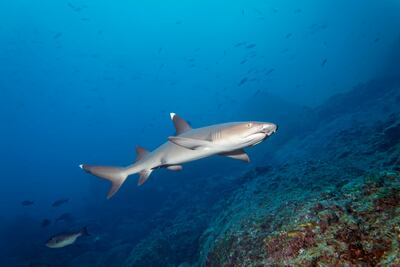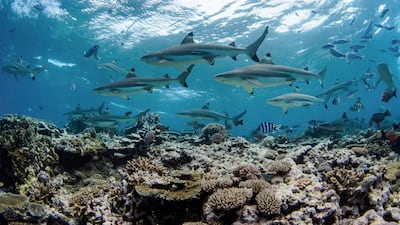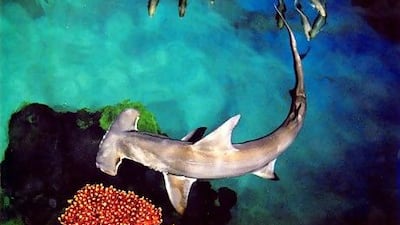Sharks and rays threatened by extinction in UAE waters are expected to be added to a protected list this year.
The extinction threat to coral reef sharks and rays is almost double that of all known shark and ray species, research published in the Nature Communications journal has shown.
Fifty-nine per cent of inhabitants of coral reefs are under threat because of overfishing, habitat loss and climate change.
Commercial fishing of some sharks and rays is already prohibited between March and June in the UAE to protect breeding populations, but they can be caught and sold in markets during the rest of the year.
A new Cites― the Convention of International Trade in Endangered Species of Wild Fauna and Flora ― listing for 56 species proposed at the 2022 Conference of the Parties in Panama will come into force this year, restricting trade to only fish caught legally and sustainably.
Cites is an inter-government agreement to protect biodiversity by ensuring wildlife trade is regulated and sustainable.
Extra protection for critical marine life
“Blacktip reef sharks and spot tail sharks were recently listed as part of the big proposal of listings of the group of requiem sharks,” said Elsayed Mohamed, regional director at the International Fund for Animal Welfare.
“Ministerial order number 42 [in the UAE] regarding the fishing and trading of sharks, does not prohibit the catching of these species yet, but it is expected to be updated by including the new Cites listing once it enters into force.”
Regulations in the UAE stipulate that sharks must not be caught within eight nautical miles of the mainland, and cannot be caught solely for their fins.
Sharks are mainly caught for food, with their liver oil, skin, fins and cartilage used in many products, while they are also snared as incidental by-catch by fisherman after other fish such as tuna or barracuda.
The Ministry of Climate Change and Environment has already banned fishing of any Cites-listed sharks and rays to protect at-risk species, while pleasure boats are also prohibited from shark fishing.
Gulf waters are home to about 153 species of sharks, rays, skates and other similar fish, with more than half now considered threatened.
A four-year national action plan for the conservation and management of sharks was launched in 2018.
It aimed to better understand different species and fisheries, and their role in the wider marine ecosystem, while developing effective policy and protection mechanisms.
Coral reefs at risk
Research by the Earth to Ocean Research Group at Simon Fraser University in Canada assessed 134 species of coral reef sharks and rays around the world.
Scientists there found 59 per cent were classified as threatened, while 14 species were critically endangered. A further 24 species were endangered and 30 per cent of all species were vulnerable.
The global extinction risk of sharks and rays, as a percentage of threatened species, on coral reefs is almost double that of all 1,199 sharks and rays, the study concluded.
The growing risk of coral reef decline, in which sharks and rays play a pivotal role in a healthy ecosystem, could be hard to reverse.
“Healthy populations of coral reef sharks and rays are so critical ― as widespread exploitation and decline of sharks has knock-on effects on both their prey and wider marine communities,” said Sharon Livermore, director of Marine Conservation Programme at IFAW.
“Declining shark numbers ― and the size of individual sharks ― directly reduces natural mortality in their prey.
“This contributes to changes in abundance and distribution of small shark and ray species, marine mammals and turtles, all of which have few other natural predators.
“Loss of sharks and rays can change predator-prey interactions and community structure, compromise food web dynamics and stability, and risk ecosystem productivity and services.”
20-year decline
Out of approximately 30 shark species found in the Arabian Gulf, more than 75 per cent are listed within the threatened categories on the International Union for Conservation of Nature Red List.
Shamsa Al Hameli, an assistant scientist from the Environment Agency — Abu Dhabi, is doing her PhD at UAE University on Elasmobranchs in Abu Dhabi.
“Several of our shark species take years to reach maturity, that includes Requiem sharks,” she said.
“Having them all in one category makes it easier to identify and protect them.
“It is not easy to tell the difference between several of these sharks, and some species would require genetic analysis to be properly identified.”
Results from a baited underwater video survey carried out in UAE waters recorded 20 species of sharks and rays out of 129 survey points.
Two species, Arabian Carpetshark (Chiloscyllium arabicum) and Stingrays (Himantura spp.) accounted for 60 per cent of the observations.
“Unlike bony fish, shark populations could take a decade or more to recover,” Ms Al Hameli said.
“Every year before the banning season, enumerators from EAD carry out an awareness campaign reminding fisherman and fish markets of the ban season.
“The agency also participates in Shark Week annually, where talks are given to the general public about the local shark diversity.”
Bull and tiger sharks are two species in rapid decline in regional waters, the International Union for Conservation of Nature said.
Also decreasing are the halavi guitarfish, spinetail devil ray, great and scalloped hammerhead shark, blacktip reef shark, white shark and bluntnose sixgill shark.
The grey reef shark, blacktip shark, graceful shark, gulper shark, dusky shark, whitetip reef shark, zebra shark, blue shark and oceanic whitetip shark are also in decline, while whale sharks and basking sharks are considered endangered in Gulf waters.
A broadening of fishing restrictions to cover more Gulf species listed by Cites would encourage populations to recover, Ms Al Hameli said.
The five pillars of Islam
1. Fasting
2. Prayer
3. Hajj
4. Shahada
5. Zakat
Who's who in Yemen conflict
Houthis: Iran-backed rebels who occupy Sanaa and run unrecognised government
Yemeni government: Exiled government in Aden led by eight-member Presidential Leadership Council
Southern Transitional Council: Faction in Yemeni government that seeks autonomy for the south
Habrish 'rebels': Tribal-backed forces feuding with STC over control of oil in government territory
The specs
Engine: 4.0-litre V8 twin-turbocharged and three electric motors
Power: Combined output 920hp
Torque: 730Nm at 4,000-7,000rpm
Transmission: 8-speed dual-clutch automatic
Fuel consumption: 11.2L/100km
On sale: Now, deliveries expected later in 2025
Price: expected to start at Dh1,432,000
Ferrari 12Cilindri specs
Engine: naturally aspirated 6.5-liter V12
Power: 819hp
Torque: 678Nm at 7,250rpm
Price: From Dh1,700,000
Available: Now
The%20Genius%20of%20Their%20Age
%3Cp%3EAuthor%3A%20S%20Frederick%20Starr%3Cbr%3EPublisher%3A%20Oxford%20University%20Press%3Cbr%3EPages%3A%20290%3Cbr%3EAvailable%3A%20January%2024%3C%2Fp%3E%0A
Specs
Engine: 51.5kW electric motor
Range: 400km
Power: 134bhp
Torque: 175Nm
Price: From Dh98,800
Available: Now
MOUNTAINHEAD REVIEW
Starring: Ramy Youssef, Steve Carell, Jason Schwartzman
Director: Jesse Armstrong
Rating: 3.5/5
More from Neighbourhood Watch
Company profile
Name: Back to Games and Boardgame Space
Started: Back to Games (2015); Boardgame Space (Mark Azzam became co-founder in 2017)
Founder: Back to Games (Mr Azzam); Boardgame Space (Mr Azzam and Feras Al Bastaki)
Based: Dubai and Abu Dhabi
Industry: Back to Games (retail); Boardgame Space (wholesale and distribution)
Funding: Back to Games: self-funded by Mr Azzam with Dh1.3 million; Mr Azzam invested Dh250,000 in Boardgame Space
Growth: Back to Games: from 300 products in 2015 to 7,000 in 2019; Boardgame Space: from 34 games in 2017 to 3,500 in 2019
Andor
%3Cp%3E%3Cstrong%3ECreator%3A%3C%2Fstrong%3E%20Tony%20Gilroy%3Cbr%3E%3Cstrong%3EStars%3A%20%3C%2Fstrong%3EDiego%20Luna%2C%20Genevieve%20O'Reilly%2C%20Alex%20Ferns%3Cbr%3E%3Cstrong%3ERating%3A%205%3C%2Fstrong%3E%2F5%3C%2Fp%3E%0A
UAE currency: the story behind the money in your pockets
ABU%20DHABI'S%20KEY%20TOURISM%20GOALS%3A%20BY%20THE%20NUMBERS
%3Cp%3EBy%202030%2C%20Abu%20Dhabi%20aims%20to%20achieve%3A%3C%2Fp%3E%0A%3Cp%3E%3Cstrong%3E%E2%80%A2%2039.3%20million%20visitors%2C%3C%2Fstrong%3E%20nearly%2064%25%20up%20from%202023%3C%2Fp%3E%0A%3Cp%3E%3Cstrong%3E%E2%80%A2%20Dh90%20billion%20contribution%20to%20GDP%2C%3C%2Fstrong%3E%20about%2084%25%20more%20than%20Dh49%20billion%20in%202023%3C%2Fp%3E%0A%3Cp%3E%3Cstrong%3E%E2%80%A2%20178%2C000%20new%20jobs%2C%3C%2Fstrong%3E%20bringing%20the%20total%20to%20about%20366%2C000%3C%2Fp%3E%0A%3Cp%3E%3Cstrong%3E%E2%80%A2%2052%2C000%20hotel%20rooms%2C%3C%2Fstrong%3E%20up%2053%25%20from%2034%2C000%20in%202023%3C%2Fp%3E%0A%3Cp%3E%3Cstrong%3E%E2%80%A2%207.2%20million%20international%20visitors%2C%3C%2Fstrong%3E%20almost%2090%25%20higher%20compared%20to%202023's%203.8%20million%3C%2Fp%3E%0A%3Cp%3E%3Cstrong%3E%E2%80%A2%203.9%20international%20overnight%20hotel%20stays%2C%3C%2Fstrong%3E%2022%25%20more%20from%203.2%20nights%20in%202023%3C%2Fp%3E%0A
Name: Colm McLoughlin
Country: Galway, Ireland
Job: Executive vice chairman and chief executive of Dubai Duty Free
Favourite golf course: Dubai Creek Golf and Yacht Club
Favourite part of Dubai: Palm Jumeirah
SERIE A FIXTURES
Saturday (All UAE kick-off times)
Cagliari v AC Milan (6pm)
Lazio v Napoli (9pm)
Inter Milan v Atalanta (11.45pm)
Sunday
Udinese v Sassuolo (3.30pm)
Sampdoria v Brescia (6pm)
Fiorentina v SPAL (6pm)
Torino v Bologna (6pm)
Verona v Genoa (9pm)
Roma V Juventus (11.45pm)
Parma v Lecce (11.45pm)
Tips to keep your car cool
- Place a sun reflector in your windshield when not driving
- Park in shaded or covered areas
- Add tint to windows
- Wrap your car to change the exterior colour
- Pick light interiors - choose colours such as beige and cream for seats and dashboard furniture
- Avoid leather interiors as these absorb more heat
UAE currency: the story behind the money in your pockets
Paris%20Agreement
%3Cp%3EArticle%2014%3C%2Fp%3E%0A%3Cp%3E1.%20%5BThe%20Cop%5D%20shall%20periodically%20take%20stock%20of%20the%20implementation%20of%20this%20Agreement%20to%20assess%20the%20collective%20progress%20towards%20achieving%20the%20purpose%20of%20this%20Agreement%20and%20its%20long-term%20goals%20(referred%20to%20as%20the%20%22global%20stocktake%22)%3C%2Fp%3E%0A%3Cp%3E2.%20%5BThe%20Cop%5D%20shall%20undertake%20its%20first%20global%20stocktake%20in%202023%20and%20every%20five%20years%20thereafter%C2%A0%3C%2Fp%3E%0A
Farage on Muslim Brotherhood
Nigel Farage told Reform's annual conference that the party will proscribe the Muslim Brotherhood if he becomes Prime Minister.
"We will stop dangerous organisations with links to terrorism operating in our country," he said. "Quite why we've been so gutless about this – both Labour and Conservative – I don't know.
“All across the Middle East, countries have banned and proscribed the Muslim Brotherhood as a dangerous organisation. We will do the very same.”
It is 10 years since a ground-breaking report into the Muslim Brotherhood by Sir John Jenkins.
Among the former diplomat's findings was an assessment that “the use of extreme violence in the pursuit of the perfect Islamic society” has “never been institutionally disowned” by the movement.
The prime minister at the time, David Cameron, who commissioned the report, said membership or association with the Muslim Brotherhood was a "possible indicator of extremism" but it would not be banned.
Chatham House Rule
A mark of Chatham House’s influence 100 years on since its founding, was Moscow’s formal declaration last month that it was an “undesirable
organisation”.
The depth of knowledge and academics that it drew on
following the Ukraine invasion had broadcast Mr Putin’s chicanery.
The institute is more used to accommodating world leaders,
with Nelson Mandela, Margaret Thatcher among those helping it provide
authoritative commentary on world events.
Chatham House was formally founded as the Royal Institute of
International Affairs following the peace conferences of World War One. Its
founder, Lionel Curtis, wanted a more scientific examination of international affairs
with a transparent exchange of information and ideas.
That arena of debate and analysis was enhanced by the “Chatham
House Rule” states that the contents of any meeting can be discussed outside Chatham
House but no mention can be made identifying individuals who commented.
This has enabled some candid exchanges on difficult subjects
allowing a greater degree of free speech from high-ranking figures.
These meetings are highly valued, so much so that
ambassadors reported them in secret diplomatic cables that – when they were
revealed in the Wikileaks reporting – were thus found to have broken the rule. However,
most speeches are held on the record.
Its research and debate has offered fresh ideas to
policymakers enabling them to more coherently address troubling issues from climate
change to health and food security.











